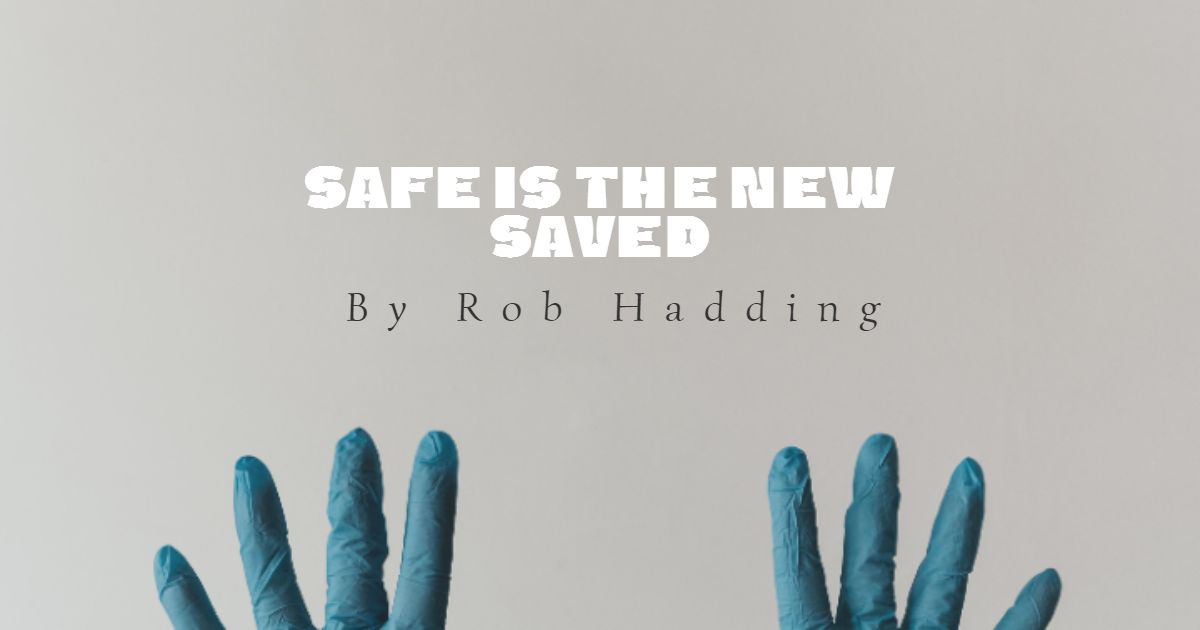Guest Post by Rob Hadding
As a young father, I considered keeping my family safe my chief duty. Reflecting on my track record a few years ago, I noted that in our family there had been no hospitalizations, no broken bones, not even stitches. Among my proudest paternal memories was the time my oldest daughter chided one of her siblings, “That’s not safe!” Not only had I done my job, but I had also adequately catechized my children in the Western Confession of Safe.
“What is the chief end of man,” the first catechism question of the Shorter Catechism of this WCS reads. The answer? “The chief end of man is to glorify man and live as comfortably as possible for as long as possible.” Every other question serves only to support and magnify this one. And it seems that those trained in it are legion.
The virus known as COVID-19 has revealed our cultural and global obsession with safety. Fear has gripped an already-anxious society, and the only reasonable response to the existential threat (see question one of the WCSSC) is to take every imaginable precaution to stay safe. Our personal safety, and ostensibly the safety of others, is the new righteousness. Safe is the new saved. We are justified by safe alone. And we have quickly codified our new religion.
And, as is the case with all religions, rites, symbols, and language are indispensable in affirming and communicating the tenets of the faith. These, of course, all attained ubiquity in a matter of weeks. I’m not necessarily referring to masks and gloves, although some go the second mile by masking up while driving alone or are out for a walk through the neighborhood alone. I’m talking about the quick acceptance of accepting digital meetings as a reasonable substitute for in-person interactions, “smiling with your eyes” over your homemade mask, and exchanging the new benediction, “Stay safe!”
But the truth is that we are not safe. We have never been safe. The ratio of individuals to deaths is a solid 1:1. Some lives are very short; others are long. No matter how much we try as persons or as societies, the end of every human life is the same. And the day of your death is fixed by the One who created heaven and earth. He keeps you alive every day except one. This assertion is not an argument for carelessness or for being cavalier. Providence is no excuse for imprudence. Safety is an illusion, and an overwrought concern for safety is to misplace your faith. Do not fear COVID-19 that can destroy your body but cannot destroy your soul. Rather fear him who can destroy both soul and body in hell.
To be human – truly human – is to live a life of risk. The world is a dangerous place. But we were made to take dominion over the dangerous world – not to make it safe, but to make it more glorious. The much-cited quotation from John A. Shedd is appropriate: “A ship is safe in harbor, but that’s not what ships are for.” May my children benefit from my repentance, and live well.
Rob Hadding is the pastor of Christ Church in Pace, Florida. He and his wife, Marty, have five increasingly dangerous children.





















I disagree emphatically; this is a terribly unhelpful post based on conjecture and reading people’s actions in the worst light possible. Why be so dramatic, and why encourage others in the same? Why doubt that motivation for others’ safety is genuine? Where on earth does the language of “justification by safe alone” come from?
“The wise see danger and take refuge.” You may disagree on what is danger, what is wisdom, and what is appropriate refuge, absolutely. But transforming your disagreement into an assessment that anyone who thinks differently from you should be compared with a Christ-denier is a pretty extreme, putting it kindly.
“Do not fear COVID-19 that can destroy your body but cannot destroy your soul. Rather fear him who can destroy both soul and body in hell.” — well, while you’re at it, don’t take any money or pack a suitcase or wear good walking shoes when you travel either because otherwise you are obsessed with safety.
I think it is possible to warn people that life is not “safe” and to remind us that we need to live life in faith, not in fear, without insultingly telling us that if we think wearing a mask or some other practice is a smart thing to do that we’ve abandoned Jesus and now worship some idol.
So who is “overwrought”? I’m getting pretty discouraged by people telling me I’m some kind of idolater because I think a bit differently about what is prudent in the times.
Doug Roorda
Pella, Iowa